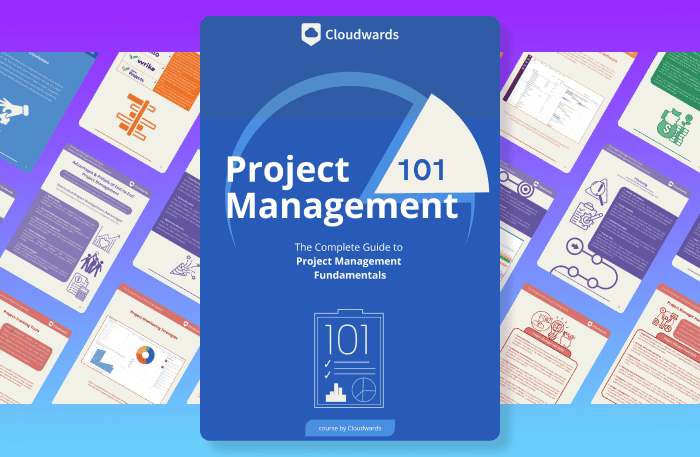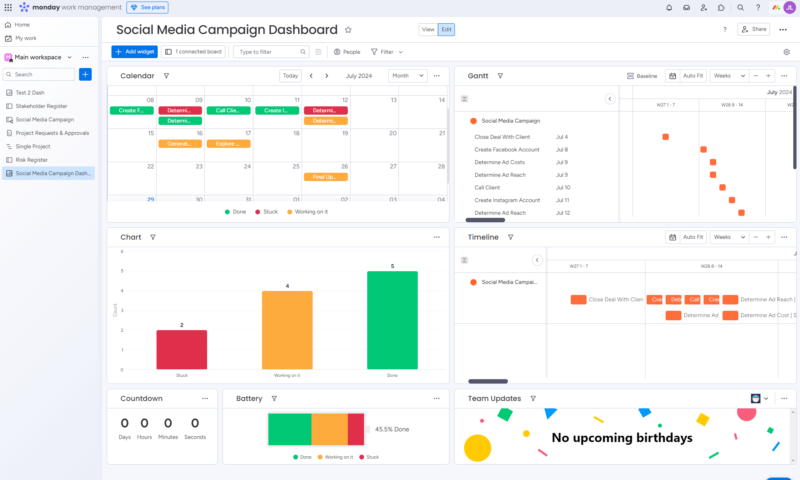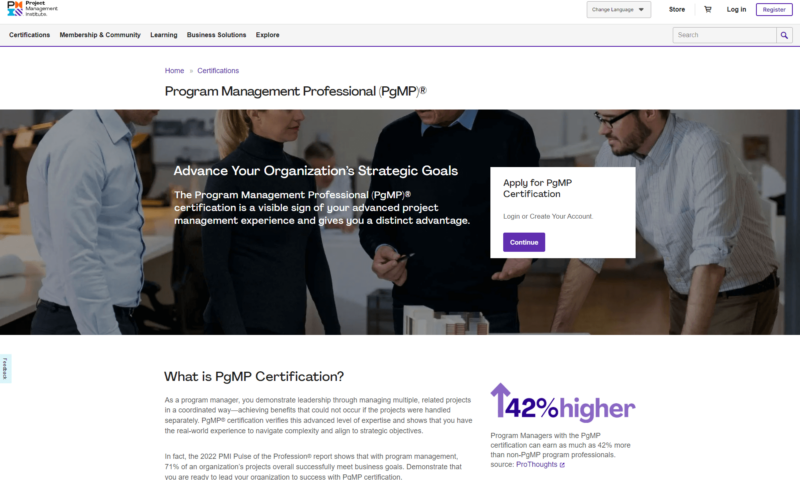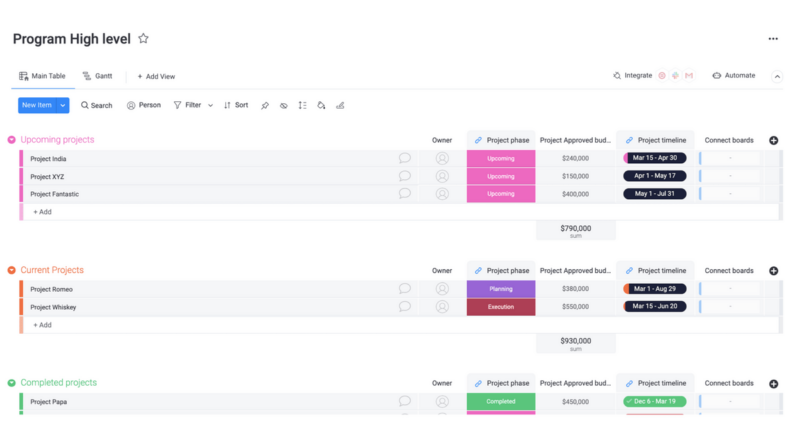What Is Program Management? Definition, Process & Best Practices in 2025
Program management: You’ve heard of it, but you’re not quite sure what it is. People often ask us, “What is program management?” Luckily, you’ll find the answer to that question in this article. Let’s take a look.
If you’re looking for the answer to the question, what is program management, then you’re in the right place. In this article, we cover all there is to know about program management and the types of responsibilities you can expect as a program manager. We’ll also share some of the best project management software that can help you juggle multiple projects.
If you manage unrelated projects, this article isn’t for you. Thankfully, our article covering portfolio management explains everything about managing business objectives across a range of differing projects. However, if you have several related projects, stick with us — by the end of this article, you’ll better understand effective program management.
What Is Program Management?
Program management is the process of managing multiple related projects in a cohesive manner. Having centralized, strategic objectives for the entire program can help different teams understand and implement program management practices across each project. Below are some best practices that are often used in program management:
- Outline processes: Clearly defining program management processes helps teams understand how they can reach their goals and complete the entire program.
- Create a centralized document: It’s worth creating a single plan that covers all projects, strategies and goals. It should include a program timeline, resource management data and budgets.
- Gather contact information: Create a document with each key team member’s information and a means to contact them. This helps foster fluid communication.
- Set KPIs: Creating key performance indicators allows you to measure the success of your overall program. You should monitor them regularly and relay data to the team to ensure successful program completion.
- Foster open communication: Create an environment where project managers feel they can come to you with issues and for support.
- Use tools: Utilize the best project management software and tools to help you manage programs effectively.
Avoid Costly Project Management Mistakes – Get Free Tips Today!

- Discover 10 fundamentals of project management
- Understand step-by-step plans for PM execution
- Learn tips to avoid 5 common mistakes by beginners

data and communication preferences.
Program Management vs Project Management
Program and project management are closely connected; however, they’re not the same. Project management includes creating and managing a range of defined tasks required to complete a single project. You can learn more in our project management guide. In program management, you need to coordinate multiple projects that are closely linked together.
For example, if you’re launching seasonal apparel, you can consider each product an individual project. Launching all the products at the same time is program management. You can use several project managers for each product and hire a program manager with a track record of managing successful programs.
Program Management Key Aspects:
- Resource management: When coordinating multiple projects, it’s important to plan the use of resources and ensure each project team can complete the program objectives. To learn more, read our guide on resource leveling vs resource smoothing.
- Program governance: This allows you to provide expectations and guidance, in turn enabling you to ensure program success for your company. It involves defining company best practices across all projects.
- Point of contact: Program managers are the point of contact not only for project managers but also for key stakeholders.
Project Management Key Aspects:
- Task management: Project managers break down large goals into smaller tasks that a team can complete.
- Managing team members: A key aspect of project management is being a point of contact and support for team members working on a specific project.
- Creating dependencies: All project managers must prioritize important tasks that must be completed to move the project forward. You can use some of the best free project management software to help with this task.
What Do Program Managers Do?
You can view program managers as the linchpin that holds several individual projects together. However, that underplays their role a little, as they’re responsible for the overall success of each project and ensuring the company delivers the program on time and to the highest standard.

software solutions to track a project’s key data.
A program manager’s role goes beyond overseeing other team members. They create program goals and design a plan to ensure the team meets those goals. A program manager assesses and manages risks, creates project dependencies and manages them in Gantt charts, and constantly analyzes key data throughout the entire program life cycle.
A program manager is often a point of contact for key stakeholders. Rather than speak with individual project managers, it’s easier for the program manager to deliver project progress updates.
It’s also the program manager’s responsibility to field updates from stakeholders and relay the information to the project team. Below are several areas of responsibility for program managers:
- Documenting the program’s objectives: Project managers must document objectives to clearly communicate what the team is aiming to achieve with the program and the significance of each project in ensuring the program goals are met.
- Program governance: The process of governance shows how a program will be managed, the expectations that are in place and how individuals can best support project managers.
- Budget management: Program managers must ensure the budget for the full program is correctly distributed across all projects, limiting overspending as much as possible, so scope creep can be avoided.
- Project interdependencies: Managers must link projects together and highlight the work that needs to be done first, so other projects can progress smoothly.
- Risk assessment: Program managers must assess and manage risks and issues to ensure the team can react to them quickly and move past them with ease.
Program Manager vs Project Manager Responsibilities
Program and project managers work closely together. Though some of their responsibilities overlap, their jobs as a whole are not the same. Below, we compare each role’s core responsibilities side by side.
| Program Manager | Project Manager |
|---|---|
| Creates a detailed program plan | Creates a series of tasks for a project |
| Manages a group of project managers | Oversees team members working on tasks |
| Reports updates to key stakeholders | Reports updates to program managers |
Program Manager Career Path Guide
A program manager has many responsibilities. It takes time to reach a point in your career path where you are eligible to become a program manager. Thankfully, there are steps you can take to speed up the process and ensure you’re the right candidate for the role.
Naturally, this will vary among employers, but some value raw experience over certifications. For example, you may have experience as a project manager or with portfolio management. However, showing proof of education may be the best way to secure a program manager role with other employers. Below, we highlight some steps you can take to continue your education.
Program Manager Salary & Job Prospects
Let’s shift the focus to money and how much one can expect to make as a program manager. The good news is that program managers can earn a great annual salary. According to ZipRecruiter, the average salary across all jobs in the United States is $75,000. 2 The average salary for a program manager in the United States is $107,000 per annum. 1
Like most jobs, there are different levels of program management. Those new to the job can expect to work on low-level programs. Those with more experience will have more high-level opportunities, often with the potential to earn higher salaries.
Final Thoughts
You should now have a deeper understanding of program management and what you need to do to land your next role. We recommend obtaining a certification, as it will not only help you with job prospects but also arm you with more knowledge to deal with real-world situations when managing a program.
Remember, we recommend using monday.com to help support you with program management. However, we also suggest looking into ClickUp and its myriad collaboration tools. Read our ClickUp review for more details.
Did you find this guide useful? What is your experience with program management? Is there another explanatory article you would like us to write? Let us know in the comments. Thanks for reading.
FAQ: Program Management
Technical program management involves managing multiple teams of software developers. Management includes ensuring each team is aligned on program goals and understands the overall program objectives.
A program management office is a department within a business. Its members are responsible for defining company standards and processes as they apply to project management within a business.
Agile program management is simply the process of planning, launching and executing initiatives within Agile teams.
A program manager is responsible for overseeing a group of related projects, whereas a project manager is responsible for individual projects.




